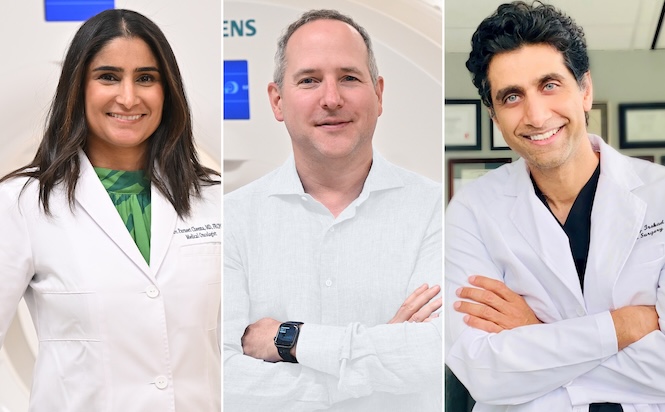According to the Canadian Cancer Society, lung cancer is the deadliest form of cancer in both males and females, accounting for one quarter of all cancer deaths in Canada. Twelve years ago, two physicians at William Osler Health System (Osler) set out to change that narrative with the launch of a lung cancer screening program to serve its growing communities. Based on the results of a recent Osler study, the program has positively impacted the lives of more than 150 patients and families.
Osler’s Lung Cancer Screening Program was the first of its kind in a community hospital in Canada. Today, it is the longest running multidisciplinary lung cancer screening program in the country outside of a research/pilot study, combining the significant expertise of Osler’s talented health care professionals in diagnostic imaging, thoracic surgery and medical oncology.
“Thanks to a $300,000 grant from the Lung Ambition Alliance, we were able to conduct a retrospective study of more than 5,000 patients who participated in our program between 2012 and 2019,” said Dr. Marc Ossip, Chief, Diagnostic Imaging, William Osler Health System and one of the screening program’s founders. “Over the eight-year period, Osler detected a high rate of cancers – primarily early stage – which is so critical given that catching cancer early often leads to a much better outcome.”
Patients entering the program had to meet specific criteria: aged 55 to 77 years, a significant history of smoking, no prior lung cancer, no prior CT scan within 12 months of having an initial Low-Dose Chest CT scan (LDCT), and former smokers must have quit the habit within the previous 15 years. The median age for participants was 63 years, with more than 60 per cent of them being male. Patients were referred through a family physician or specialist.
“What we were seeing as thoracic surgeons back in 2012 was that the majority of patients were coming to the hospital with late-stage lung cancer,” said Dr. Kashif Irshad, Division Head, Thoracic Surgery, William Osler Health System, who partnered with Dr. Ossip to create the program and is one of its most ardent champions. “For us, at Osler, a lung cancer screening study in the New England Journal of Medicine, at that time, crystallized that we needed to create an evidence-based lung cancer screening program to better serve our communities. I am grateful that we have a supportive hospital executive team that agreed.”
Given there was no dedicated funding available for the program, the hospital tapped into its budget to cover associated costs. The results of Osler’s eight-year study validate that the investment has made a significant positive difference in the health of people in its communities.
The study revealed that more than 680 new patients entered the program each year, with an average program growth rate of 27.6 per cent. To date, the Lung Cancer Screening Program recorded over four per cent cancer detection rate, which is higher than similar major studies. Of those patients requiring lung biopsies, more than half were malignant and another 12 per cent were suspicious for cancer. As a result of the program, the clinical stage of lung cancer detected was primarily early stage (Stage I or 2).
Thoracic surgeons typically present complicated patient cases at weekly multidisciplinary rounds to get the input of the entire team. This collaborative group includes a molecular pathologist, radiologist, radiation doctor, and medical oncologist. If lung cancer is found early and surgery is required, this often means a less-involved surgery, such as the removal of a lobe or section of a lung.
“Not only are we finding cancers early, we’re discovering that involvement in the screening program is triggering many patients to re-evaluate their smoking habits whether cancer is detected or not,” said Dr. Irshad, who notes that the program also links patients to a smoking cessation program in their own community if wanted.
Given most lung cancer screening programs are in highly specialized centres, those living in smaller communities have limited or no access to them. Osler’s experience demonstrates that multidisciplinary lung cancer screening programs are effective and can be implemented on a much broader scale in community hospitals across the country with
excellent outcomes.
“Osler recognized that establishing a lung screening program was the right thing to do and took the steps to make it a reality for our community,” said Dr. Parneet Cheema, Medical Director of Cancer Care and Head of Cancer Research, William Osler Health System. “We work seamlessly as a team across diagnostic imaging, thoracic surgery and medical oncology to screen and treat these patients. As the study showed, it saved the lives of many people whose cancer would have otherwise gone undetected.”
The program was recently approved for funding through Cancer Care Ontario (CCO) as a designated Ontario Lung Cancer Screening location. It was also profiled at the World Conference on Lung Cancer in San Diego in September 2024, and will be featured at the Radiology Society of North America’s Annual Meeting in Chicago in December 2024.
Osler’s cancer care program offers a wide range of high quality and compassionate cancer care services including prevention, screening, diagnosis and treatment. The organization is currently working diligently on plans for a comprehensive Cancer Care Centre at Brampton Civic Hospital that will bring new and expanded cancer care services – including radiation therapy – closer to home.
Family physicians and specialists who wish to refer patients to Osler’s Lung Cancer Screening Program can do so by downloading the referral form from Osler’s website.


